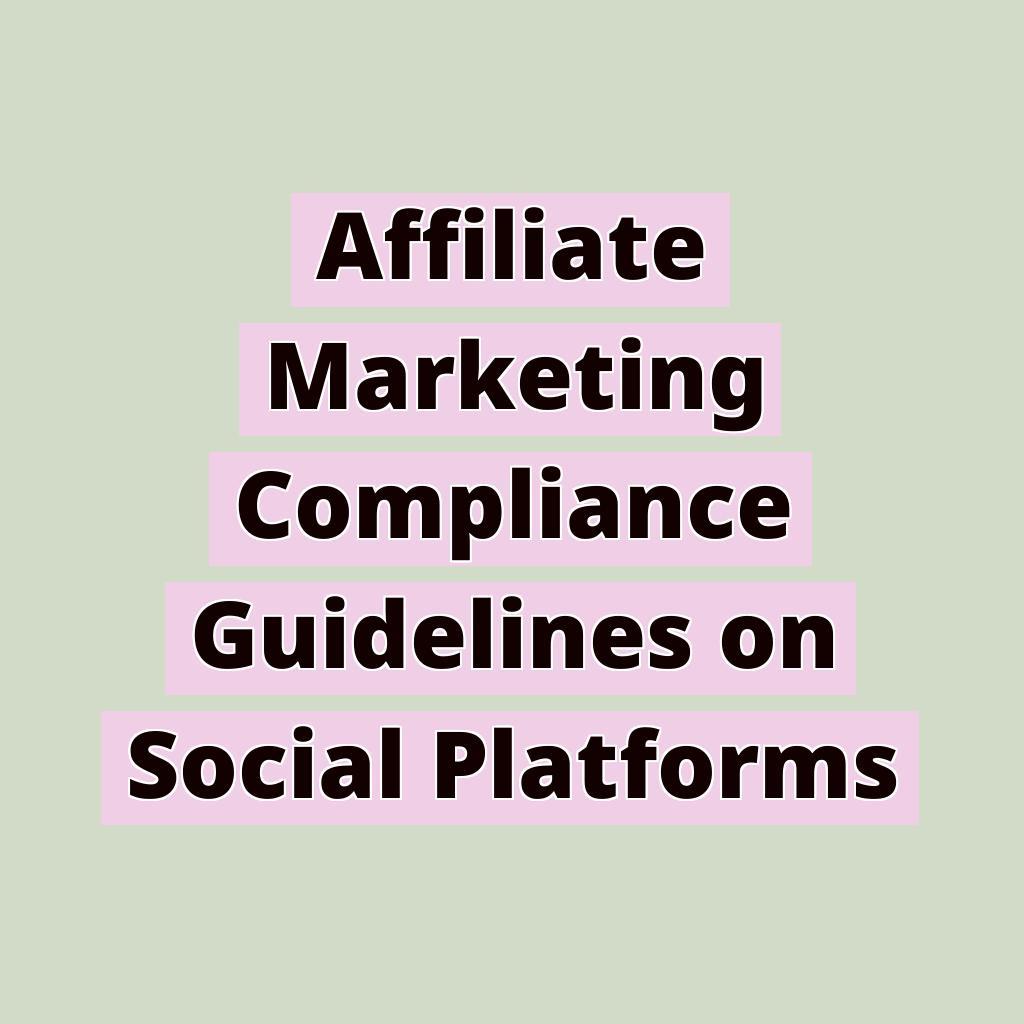Navigating the world of affiliate marketing on social platforms? You’re in the right place! It’s thrilling yet demanding. Understanding the compliance guidelines is like decoding a secret language. It’s all about balancing creativity with the rules.
But why bother, you ask? It’s simple. Staying within these guidelines keeps your content authentic and, most importantly, out of trouble. So, whether you’re a seasoned marketer or just dipping your toes, I’m here to guide you through. Ready to dive in? Let’s untangle this complex web together!
Affiliate Marketing Disclosure Requirements on Social Platforms
Stepping into the realm of disclosures, things get a tad more serious. But fear not! It’s all about being transparent with your audience. Honesty is, after all, the best policy, right?
Every post, tweet, or share that’s promoting a product for a little something in return needs a clear shoutout. It’s like telling your friends, “Hey, I might get a commission for this, but I genuinely recommend it.” Simple, right?
Platforms like Instagram, Twitter, and Facebook have set their own rules. But the principle stays the same: Be upfront about your affiliate links. A #ad or #sponsored might seem small, but it packs a punch in maintaining trust.
Remember, it’s not just about avoiding penalties. It’s about building a relationship with your followers based on trust. So next time you post, make that disclosure loud and clear. Your audience will appreciate your honesty, and hey, it keeps the compliance police happy too!
Let’s keep those affiliations transparent. It’s a win-win for everyone involved.
FTC Guidelines for Affiliate Marketers on Social Media
Now, onto a bigger player in the game: the Federal Trade Commission, or as you’ll often see it, the FTC. They’ve got some say in this whole affiliate marketing scheme on social media.
The FTC’s rule of thumb? Transparency is king. They want to make sure your followers aren’t being misled by the content you’re putting out there. It’s like saying, “Hey, I’ve got skin in the game here,” without making your followers play detective to figure it out.
Clear and conspicuous disclosures are the name of the game. That means slapping your #ad or #sponsored tag in a place that’s easy to see—not hidden away where no one’s likely to find it.
Let’s talk specifics. The FTC wants these disclosures to be in plain language. No fancy jargon or confusing terms. Think of it as explaining it to a friend who’s not in the marketing biz.
Timing is everything. Make your disclosure early in your post or video. Don’t wait until the very end when half your audience might have bounced.
Last but not least, you’ve got to be consistent. Whether you’re on Instagram, tweeting away, or making waves on Facebook, these rules apply across the board.
Key Rules for Promoting Affiliate Products on Social Platforms
Alright, so now that we’ve got the FTC guidelines down pat, let’s talk strategy. When you’re diving into promoting affiliate products on social platforms, there are a few key rules you’ll want to stick to.
First things first, know your product inside out. Your followers will come to you with questions, and you’ll need to be ready with the answers. It’s about building trust. If you show you’re knowledgeable, they’re more likely to take your word for it.
Choose products that align with your brand. It’s a bit like dating—you want to be sure you’re a good match before you introduce them to your friends. If your niche is in eco-friendly products, an affiliate partner in fast fashion might raise a few eyebrows.
Engage with your audience. When you share a product, don’t just drop a link and run. Stick around. Answer questions. Join the conversation. It shows you’re genuinely interested, not just in it for the commissions.
Keep it real. Your credibility is on the line every time you recommend something. If you love the product, say so. But if it’s not for you, don’t be afraid to share that too. A balanced view is invaluable.
Remember, success won’t happen overnight. It’s more like a slow burn, building trust and credibility over time. Patience is your best friend here.
By sticking to these key rules, you’re setting yourself up for success. Promoting affiliate products on social platforms can be a smart move, but only if you’re thoughtful about how you do it. Transparency, honesty, and genuine engagement are your best tools. Happy posting!
Best Practices for Ensuring Affiliate Marketing Compliance on Social Media
Navigating the world of affiliate marketing on social media while keeping in line with all the rules can feel a bit like walking a tightrope. You want to stay balanced between promoting effectively and staying compliant. So, how do you do that? Let’s dive in.
Transparency is key. When you’re sharing an affiliate link, make it clear. You can use hashtags like #ad or #sponsored. It’s simple but crucial. This tiny step keeps you on the right side of regulations.
Know the guidelines of your platform. Each social media site has its own set of rules for affiliate marketing. Take a little time to get familiar with them. It’s a bit of homework, but think of it as protecting your investment.
Use Clear Disclaimers
Don’t hide your disclaimers in a mountain of hashtags or at the bottom of a long post. Put them up front. Your audience shouldn’t have to play detective to find out you’re marketing to them. Plain language wins here.
Monitor your content regularly. What worked yesterday may not work tomorrow. Rules change, and it’s on you to stay updated. A regular check-up can save you a world of trouble down the line.
Lastly, educate yourself continuously. Whether it’s a webinar, an online course, or articles, keep learning. The landscape of affiliate marketing and social media changes rapidly. Staying informed is not just beneficial—it’s essential.
Sticking to these best practices can seem like a bit of a juggle at first. But with time, it becomes second nature. Compliance doesn’t have to be a roadblock to success. In many ways, it’s the foundation for building trust with your audience and ensuring your affiliate marketing efforts are built to last. Keep it transparent, stay educated, and happy marketing!
Understanding the Importance of Transparency in Affiliate Marketing
Let’s get straight to the point. Transparency is a big deal in affiliate marketing. And here’s why. It’s all about building trust. When your audience knows you’re sharing an affiliate link, they appreciate the honesty. It’s like saying, “Hey, I believe in this product, and here’s why you might too.”
But there’s more to it than just trust. It’s also about respect. By being upfront, you’re showing your audience that you value their ability to make informed decisions. Nobody likes feeling tricked. Transparency ensures that your audience knows exactly what they’re getting into.
Now, think about longevity. In the grand scheme of things, we’re all aiming for long-term success, right? Here’s the kicker: transparency isn’t just good ethics; it’s smart business. When people trust you, they’re more likely to stick around, listen to what you have to say, and even become repeat customers.
So, how does this impact your content? It changes the game. Content backed by genuine recommendations and clear disclosures tends to resonate more. It feels personal and, dare I say, real. This realness is what sets you apart in the crowded world of social media.
And let’s not forget about the legal side of things. Adhering to regulations isn’t optional; it’s mandatory. The repercussions of not doing so can be pretty severe. Think fines, bans, and a hit to your reputation. Needless to say, it’s a risk not worth taking.
In essence, transparency in affiliate marketing isn’t just a best practice—it’s a cornerstone of a successful strategy. It impacts everything from trust to legality. So, let’s keep it clear, keep it honest, and keep it going. Your audience, and your conscience, will thank you for it.
Ensuring FTC Compliance in Affiliate Marketing Partnerships on Social Media
Okay, so we’ve talked about why transparency is important. Now, let’s dive into keeping things cool with the FTC. Yep, the Federal Trade Commission means business when it comes to rules and social media. It’s all about making sure that everyone plays fair in the affiliate marketing sandbox.
First up, disclosures. They’ve got to be clear and conspicuous. No burying the lead in fine print or at the bottom of a long post. When you’re sharing an affiliate link, the disclosure needs to be hard to miss. Think of it as giving your audience the full picture right off the bat.
And here’s something to chew on: the language matters. Saying “thanks to our friends at [Brand]” might be nice but doesn’t cut it. You want to use straightforward language like “ad,” “sponsored,” or “affiliate.” This leaves no room for confusion and keeps you on the right side of the guidelines.
But hey, don’t let this scare you. It’s actually pretty straightforward once you get the hang of it. Social media platforms are catching up too, offering tools to make tagging sponsored content a breeze. Use them! They’re there to help both you and your audience navigate these waters with more ease.
Remember, different platforms might have their own set of rules. But the bottom line stays the same: be honest and clear about your affiliate relationships. A quick check of the current guidelines before you post can save you a headache down the line.
So, why go through all this trouble? Well, besides dodging potential fines, it’s about maintaining that bond of trust with your audience. The kind of trust that turns followers into fans. And in this world, that’s golden.
In short, keeping in line with FTC guidelines isn’t just about compliance; it’s about respect. Respect for the rules, sure, but more importantly, respect for your audience. And that’s what’s going to set you apart in this game. Let’s keep it clean, transparent, and successful.
Risks of Non-Compliance with Affiliate Marketing Guidelines on Social Platforms
Now, let’s shift gears a bit and talk about the flip side. Playing fast and loose with affiliate marketing rules on social media? Yeah, that can land you in hot water. And trust me, it’s not the kind of splash you want to make.
First off, there’s the legal side of things. The FTC isn’t just handing out friendly advice; these are regulations designed to protect consumers. Ignoring them? Well, that can lead to sanctions, fines, and a whole bunch of legal headaches you definitely don’t want.
But it’s not just about the law. It’s about your rep. Getting tagged as someone who doesn’t play by the rules can damage your credibility. And in the social media universe, credibility is everything. Once you lose the trust of your audience, it’s a steep uphill battle to win it back.
And let’s not forget about the platforms themselves. Social media giants have their own rules and tools in place for a reason. If they catch you breaking the party rules too often, you might find yourself out on the digital sidewalk. Imagine being banned or restricted on a platform where you’ve built your empire. Ouch.
The ripple effect can be huge, too. Advertisers and brands are always watching. They want to partner with influencers who not only deliver results but do it the right way. End up on their naughty list, and you might just find those lucrative deals drying up.
In essence, the risks of non-compliance are a triple threat: legal issues, damaged reputation, and lost opportunities. It’s like a domino effect where one bad move can send everything tumbling down.
So, yeah, keeping those guidelines front and center isn’t just good practice. It’s essential for anyone looking to make a mark (and a living) in the world of affiliate marketing on social media. Let’s stick to the straight and narrow – it’s simply not worth the gamble.
Conclusion: Implementing Effective Compliance Strategies for Affiliate Marketing on Social Media
Wrapping things up, it’s crystal clear that playing by the rules isn’t just good advice—it’s a must for anyone dabbling in affiliate marketing on social media. But don’t sweat it. Implementing effective compliance strategies is totally doable, and it starts with education.
Knowing the guidelines like the back of your hand is step one. The FTC and social media platforms lay it all out for you. Take the time to get familiar. Ignorance isn’t bliss in this game. It’s a fast track to trouble.
Transparency is your best friend. Always err on the side of over-disclosing. A simple disclaimer can go a long way in maintaining trust with your audience and staying in the clear with regulations. Make it clear, make it conspicuous, and make it a part of every post.
Regular audits of your content can also save you headaches down the road. It’s easy to miss something in the daily grind. Set aside time to review your posts and ensure everything is up to snuff. Think of it as a health check for your affiliate marketing efforts.
Last but not least, do it for your audience. They’re the reason you’re here. Building and maintaining their trust is not just about compliance, but about respect and integrity.
In a nutshell, staying compliant with affiliate marketing guidelines on social media isn’t just about avoiding penalties. It’s about respecting your audience and valuing the trust they place in you. Educate yourself, be transparent, conduct regular checks, and always, always put your followers first. Do that, and you’re not just compliant—you’re a class act in the world of affiliate marketing.







